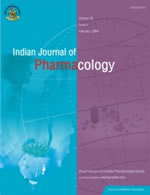
|
Indian Journal of Pharmacology
Medknow Publications on behalf of Indian Pharmacological Society
ISSN: 0253-7613
EISSN: 0253-7613
Vol. 43, No. 2, 2011, pp. 183-186
|
 Bioline Code: ph11048
Bioline Code: ph11048
Full paper language: English
Document type: Research Article
Document available free of charge
|
|
|
Indian Journal of Pharmacology, Vol. 43, No. 2, 2011, pp. 183-186
| en |
Impact of proton pump inhibitors on efficacy of clopidogrel: Review of evidence
Mistry, Suresh D.; Trivedi, Hiren R.; Parmar, Dinesh M.; Dalvi, Prashant S. & Jiyo, Chacko
Abstract
Clopidogrel is a prodrug which requires cytochrome P450 2C19 (CYP 2C19) enzyme for its conversion to an active thiol metabolite. Proton pump inhibitors (PPIs) inhibits enzyme CYP 2C19 interfering with the conversion of clopidogrel into its active metabolite. Studies document the possible interaction of clopidogrel and PPIs leading to a decrease in the antiplatelet efficacy of clopidogrel. A PubMed/MEDLINE database literature search was carried out and the bibliographies of found articles were checked for other relevant literature. Most retrospective cohort studies and studies using platelet markers found a significant association between PPI use especially omeprazole and decreased efficacy of clopidogrel while few comparative trials using clinical outcomes found no association between the same. Pantoprazole was not associated with the decrease in the antiplatelet efficacy of clopidogrel. Patients on dual antiplatelet therapy and/or with a history of gastrointestinal bleed will require gastroprotection in the form of PPIs. In such cases, pantoprazole should be the preferred PPI. Rabeprazole can be used as an alternative.
Keywords
Clopidogrel, drug interaction, omeprazole, proton pump inhibitors
|
| |
© Copyright 2011 Indian Journal of Pharmacology.
Alternative site location: http://www.ijp-online.com
|
|
